View the trailer: Bhopali
Sign the petition to President Obama: Union Carbide / Dow must clean up their mess in Bhopal, India.
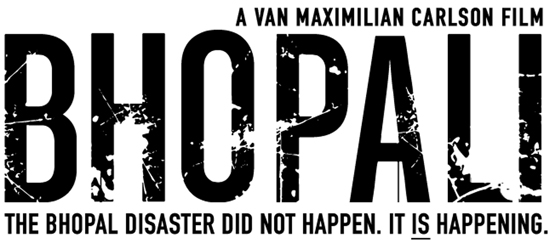 BHOPALI documents the experience of second generation children affected by the Union Carbide gas disaster of 1984, the worst industrial disaster in history, and subsequent contamination of groundwater by Union Carbide Corporation (an American company now owned by Dow Chemical, the second largest chemical company in the world). It follows several children as they and their families cope with the ongoing medical and social disaster, as well as their memories of that traumatizing night that shocked the world and changed Bhopal forever. Set against the backdrop of vehement protests for the 25th anniversary of the disaster, the Bhopalis continue to fight for justice, proving to be anything but victims.
BHOPALI documents the experience of second generation children affected by the Union Carbide gas disaster of 1984, the worst industrial disaster in history, and subsequent contamination of groundwater by Union Carbide Corporation (an American company now owned by Dow Chemical, the second largest chemical company in the world). It follows several children as they and their families cope with the ongoing medical and social disaster, as well as their memories of that traumatizing night that shocked the world and changed Bhopal forever. Set against the backdrop of vehement protests for the 25th anniversary of the disaster, the Bhopalis continue to fight for justice, proving to be anything but victims.
Featuring: Professor Noam Chomsky, Rajan Sharma, Sanjay Verma, Satinath Sarangi, Salam Babu, Rashida Bee
Director’s Bio
Van Maximilian Carlson is an awardwinning director / editor from Los Angeles. His short films won two “Best Director” awards, a “Best Thriller” award, and his documentary NINTH NOVEMBER NIGHT was considered “one of the outstanding documentaries of 2004” by the Academy Documentary Screening Committee. BHOPALI is his feature-documentary directorial debut.
Producer’s Statement
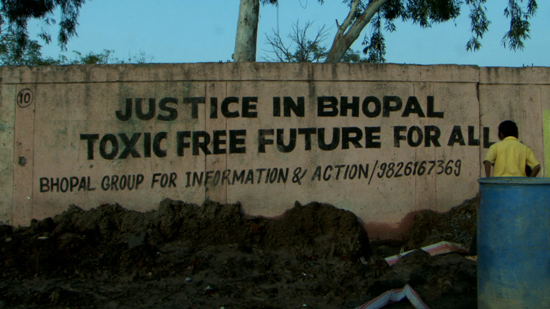 The experience of filming in Bhopal has been a profound event in my life. The Bhopal people have been resilient and continue to be an inspiration to our planet, and I have come away with a genuine love and respect for everyone I met there. They have taught me that no matter what kind of adversity you confront, you can find the power within yourself to overcome tremendous obstacles. My hope is that this film leads to a campaign for ‘No More Bhopals’ anywhere. Kirk Palayan
The experience of filming in Bhopal has been a profound event in my life. The Bhopal people have been resilient and continue to be an inspiration to our planet, and I have come away with a genuine love and respect for everyone I met there. They have taught me that no matter what kind of adversity you confront, you can find the power within yourself to overcome tremendous obstacles. My hope is that this film leads to a campaign for ‘No More Bhopals’ anywhere. Kirk Palayan
Bhopali has been accepted into the Slamdance Film Festival in the US – screenings start this weekend.
View the trailer: Bhopali
(©Oddbox Films. All Rights Reserved.)
Can you help us find venues for screenings? Please contact us immediately!
Synopsis
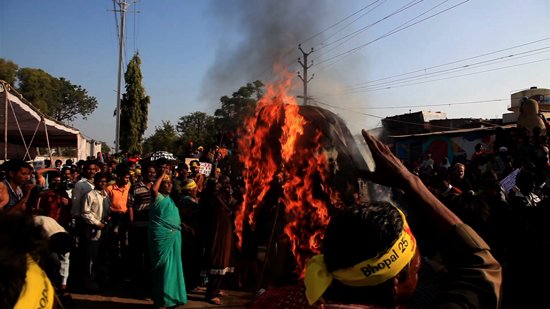 In 1984, a Union Carbide factory gas leak contaminated and killed thousands in Bhopal, India. Their suffering continues today. BHOPALI is a modern portrait of shattered lives in the community surrounding the abandoned Union Carbide factory, focusing on victims of the disaster and their families as they continue life amongst the indelible remainders of contamination and death. Fueled by their suffering, the community fights against the American corporation responsible.
In 1984, a Union Carbide factory gas leak contaminated and killed thousands in Bhopal, India. Their suffering continues today. BHOPALI is a modern portrait of shattered lives in the community surrounding the abandoned Union Carbide factory, focusing on victims of the disaster and their families as they continue life amongst the indelible remainders of contamination and death. Fueled by their suffering, the community fights against the American corporation responsible.
BHOPALI opens on the eve of the 25th anniversary of the disaster. An enraged crowd gathers at the abandoned gates of the Union Carbide factory, shouting slogans and demanding justice. They burn effigies of Union Carbide executives and government 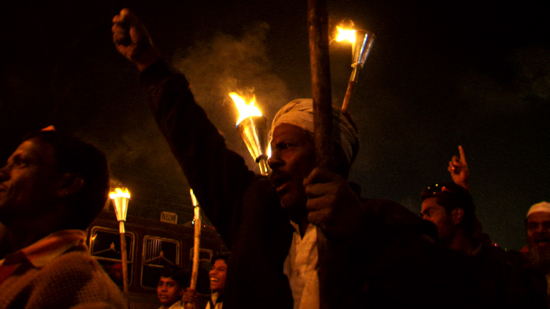 officials. This demonstration of anger and pain are the results of the horrific events which transpired on the night of December 3, 1984 at the Union Carbide factory in Bhopal, India. On that night, a gas, methyl-isocyanate, leaked from the factory and swept through the surrounding community, killing more than 8000 people in 72 hours. After the disaster, Union Carbide abandoned the factory, leaving thousands of metric tons of toxic waste at the factory site. For 25 years the toxic pollutants have slowly seeped into the communities water supply and the contamination has been detected as far away as 3km from the main plant campus.
officials. This demonstration of anger and pain are the results of the horrific events which transpired on the night of December 3, 1984 at the Union Carbide factory in Bhopal, India. On that night, a gas, methyl-isocyanate, leaked from the factory and swept through the surrounding community, killing more than 8000 people in 72 hours. After the disaster, Union Carbide abandoned the factory, leaving thousands of metric tons of toxic waste at the factory site. For 25 years the toxic pollutants have slowly seeped into the communities water supply and the contamination has been detected as far away as 3km from the main plant campus.
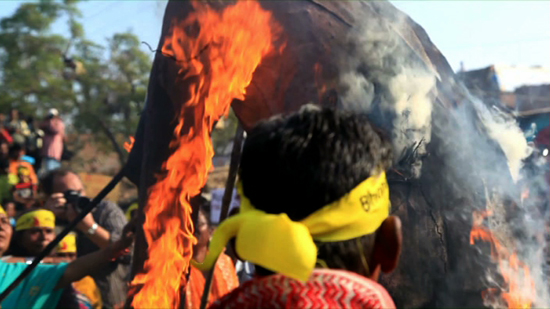 In a 2009 lab study, Chandra Bushan of the New Delhi-based Center for Science and Environment (CSE) confirms that the groundwater and soil inside and outside the factory hold dangerous levels of chlorinated solvents, pesticides and heavy metals. Mercury levels are as high as 8188 parts per million, or 164 times higher than Canadian standards for acceptable levels in industrial areas.
In a 2009 lab study, Chandra Bushan of the New Delhi-based Center for Science and Environment (CSE) confirms that the groundwater and soil inside and outside the factory hold dangerous levels of chlorinated solvents, pesticides and heavy metals. Mercury levels are as high as 8188 parts per million, or 164 times higher than Canadian standards for acceptable levels in industrial areas.
Satinath Sarangi, activist and managing trustee of the Sambhavna Clinic, which treats survivors of the disaster, tells us that:
For the Bhopal people the disaster has been unending. There are more than 100,000 people still chronically ill. In the next generation there are children born to gas-affected people that are being born with birth defects, growth disorders, and additionally there are 30,000 people who have been forced to drink contaminated water for the last 15 years… and the fact is that the suffering hasn’t ended, and that injustice continues, and the individuals and agencies responsible for this mass disaster remain unpunished.
SAIBA BABU, an 18-month-old infant, was born in 2008 with debilitating birth defects due to the contaminated water near the factory. We witness her father’s attempt to restore Saiba’s health within a hospital system ill equipped and incapable of helping. Salam Babu (Saiba’s Father):
Here at the hospital, money talks. You give money, and you’ll be looked after. We are poor people, and we don’t have money, and that’s why no one looks after us, even if your child is dying.
UNION CARBIDE has denied liability for the environmental disaster 25 years in the making. In 2009, a spokesman for Union Carbide stated that:
The government of India is the appropriate entity to express any ongoing needs of the people of Bhopal. We are saddened that the site remains unremediated. The site today is in the hands of the Madhya Pradesh Government. The state government owns the site…
To further complicate the case, Dow Chemical, the biggest chemical company in the world, purchased Union Carbide in 2001. All of Union Carbide’s assets were acquired by Dow, yet all of their Indian liabilities were rejected.
Rajan Sharma, a lawyer representing a class action lawsuit against Union Carbide, states that under the:
Polluter pays principle…the liability for pollution should always be traced back to the polluter. The polluter should not be able to externalize the cost of pollution onto society at large, or onto third parties. It shouldn’t be the government’s responsibility to clean up the site, at the public’s expense, after private polluters.
In a BBC interview on December 3, 2009, Shivraj Singh Chohaun, the Chief Minister of Madyha Pradesh, India, stated that there is “no truth” in the fact that poisonous chemicals are still at the factory site, reiterating that “there was nothing hazardous for human lives there, immediately, or later on.” The government’s refusal to recognize the pollution has seriously impacted the lives of the Bhopal survivors, and their children, many of whom are born with birth defects and have few places to turn for help. There is one place these children can turn: The Chingari Trust.
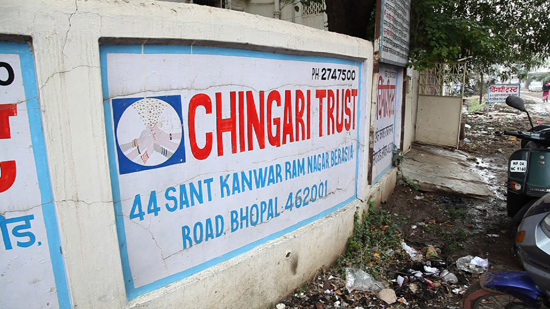 THE CHINGARI TRUST is a rehabilitation center in Bhopal that treats and educates children born with debilitating physical and mental conditions caused by the contaminants from Union Carbide. The trust is a safe-haven for the children of Bhopal and their mothers, who depend on and attend Chingari regularly.
THE CHINGARI TRUST is a rehabilitation center in Bhopal that treats and educates children born with debilitating physical and mental conditions caused by the contaminants from Union Carbide. The trust is a safe-haven for the children of Bhopal and their mothers, who depend on and attend Chingari regularly.
BHOPALI documents the heartbreaking conditions of the children at Chingari, while contrasting the hopes of mothers who witness their child’s progress, with the anguish of those whose children will never improve. Rashida Bee and Champa-Devi Shukla co-founded the trust using Goldman Prize money which they were awarded for their dedication to helping the cause of Bhopal gas disaster victims.
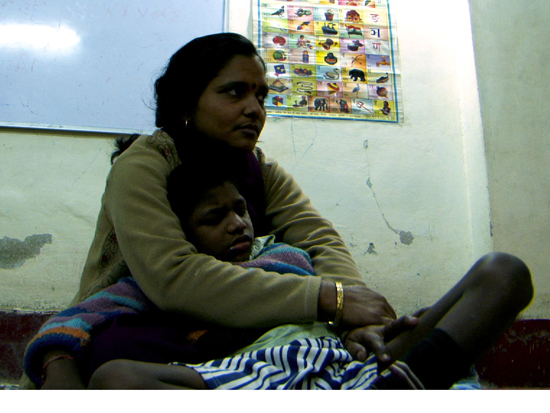 Mita Manish was born to the parents of first generation gas victims. She suffers from a permanent nervous disorder which causes her to shake. Her son, Sidesh, has severe development delays and cerebral palsy. Mita and Sidesh depend on Chingari, both for physical rehabilitation and emotional support. Her hope is that her “son will be able to walk one day.”
Mita Manish was born to the parents of first generation gas victims. She suffers from a permanent nervous disorder which causes her to shake. Her son, Sidesh, has severe development delays and cerebral palsy. Mita and Sidesh depend on Chingari, both for physical rehabilitation and emotional support. Her hope is that her “son will be able to walk one day.”
BHOPALI follows the Chingari Trust over the course of a year, starting in January 2009. In August 2009, Chingari received a grant from the Bhopal Medical Appeal, which allowed them to expand their facilities, treat more children, and hire three new teachers who specialize in speech, specialty education, and physical therapy.
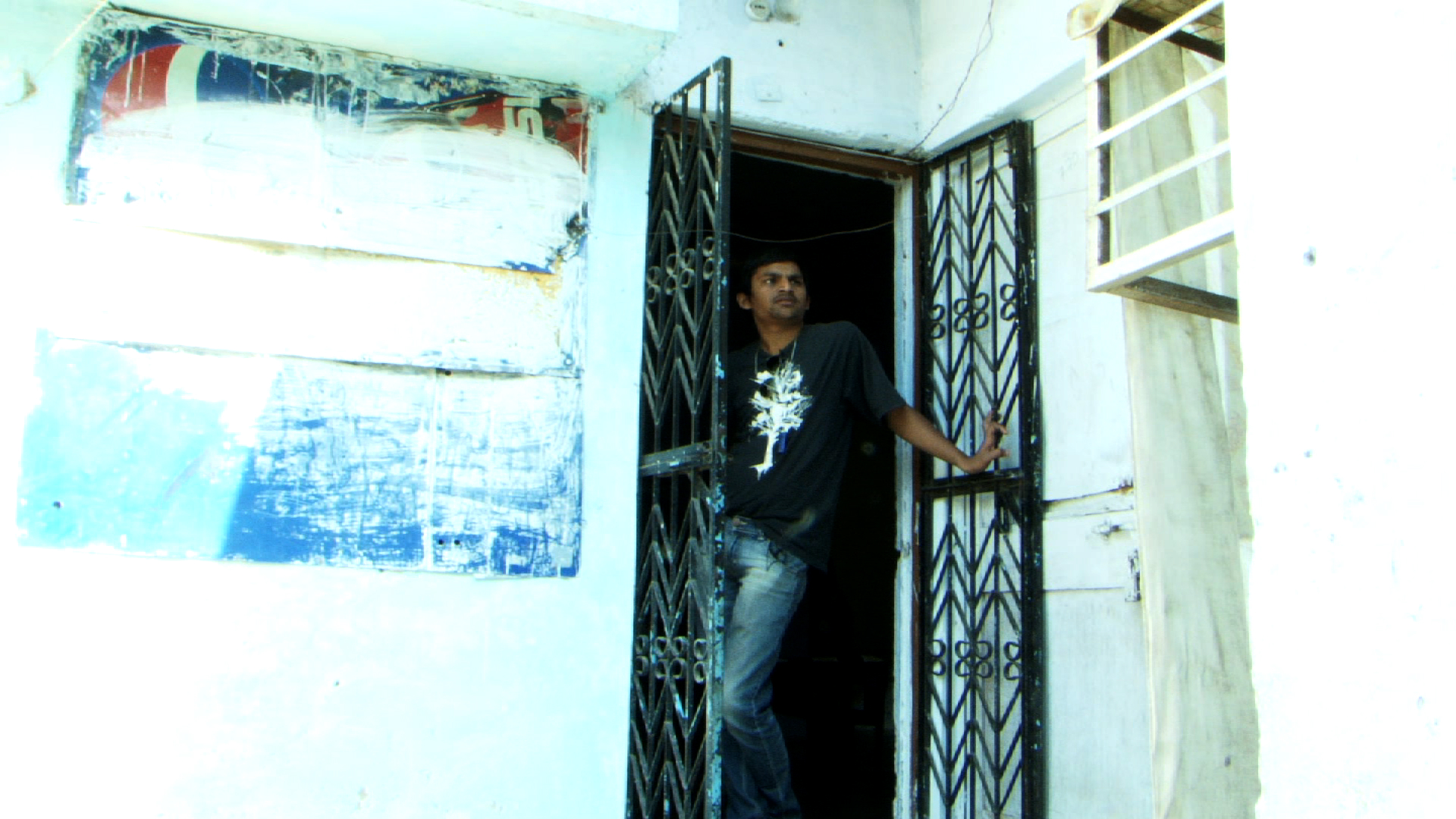 Sanjay Verma was 6-months-old when the disaster killed his mother, father, and five brothers and sisters in one night, leaving only his older siblings Sunil and Mumpta alive. Sanjay searches for answers to lingering questions that have haunted him throughout his life. “Where was God when my family died? Where was God when my brother took his life? Where was God?”
Sanjay Verma was 6-months-old when the disaster killed his mother, father, and five brothers and sisters in one night, leaving only his older siblings Sunil and Mumpta alive. Sanjay searches for answers to lingering questions that have haunted him throughout his life. “Where was God when my family died? Where was God when my brother took his life? Where was God?”
His many questions over those who died that night, his family, and God, have led him to activism. Sanjay’s heroic struggle, transcending from a victim to a survivor to an activist, has given him hope.


